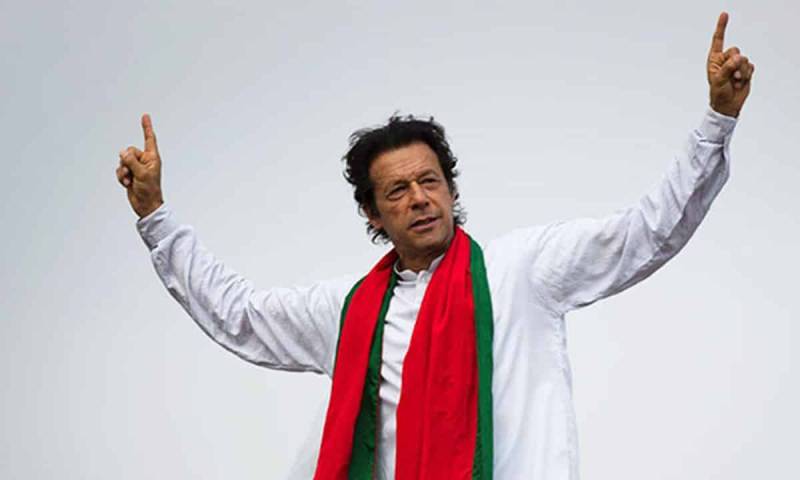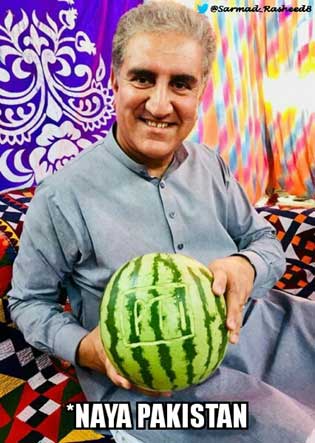
The writer explains how the PTI was marketed successfully, employing slogans that exploited people’s insecurities
Have you ever thought why your college friend Babloo always preferred Coca Cola for a soft drink and not Pepsi? Or why is that Aunty Sakeena next door is adamant to buy the washing powder Ariel and not Surf Excel or Bonus Plus? You might think that it is the quality of these products that gives them an edge over the other, but that’s not always the case. In fact, different marketing strategies are employed by organizations to create a perception of the superiority (often termed as competitive advantage) of their product to the others. That’s why you’ll hear every other ad on the TV to repeat the same slogan like “Pakistan’s number one washing powder” or “Pakistan ka tez tareen network (Pakistan’s fastest network)”. Almost all of them convey the same message i.e. their product is “the best” that’s available in the market and that’s the only thing you need.
However, these marketing methods are not used for the sale of consumer goods only, but rather ideas and narratives are also propagated by using similar tactics, which often times, exploit the insecurities of people rather than convincing them of the actual benefits associated with buying that product.
Edward Bernays, named as one of the 100 most influential Americans of the 20th century by Life, serves as a perfect example for this. In the USA, back in 1920s, women did not smoke or if they did, they were severely judged for it because it was considered a taboo at that time. This meant that around 50% of the population was not buying cigarettes. American Tobacco Company tried several times to market cigarettes to women but to no avail. However, all this was to change when in 1928, American Tobacco Company hired Edward Bernays, a man who was highly unorthodox and iconoclastic in his approach.
Bernays hired a group of women and got them into Easter Sunday Parade in New York. Back in those days, parades were big events that were watched with zealousness by most people, much like people in Pakistan used to watch 14th August ceremonies on PTV about 30 years ago. Bernays planned so that the women in the parade would all stop at a particular time and light up their cigarettes. To capture this, Bernays hired professional photographers to take photos of these women, which he then circulated to all national newspapers and told them that these women were not just lighting cigarettes but rather they were lighting the “torches of freedom”.
Bernays’ astute machination was a success and after that, women got to enjoy lung cancer as much as men. The sales of cigarettes increased and the field of marketing was revolutionized in the years to come. What’s important to note here though is that by equating ‘smoking’ to the ‘freedom’, Bernays successfully managed to sell his product under the cloak of a political message.
Fast forward to 2013, when we are promised a ‘Naya Pakistan’ (New Pakistan) and ‘Tabdeeli’ (Change) by an emerging political party. The very first narrative sold was “Ham Parhe Likhe Log Han” (We are educated people), implying that anyone who supports PTI is a well-educated person and conversely, anyone who supports either one of PPP or PML-N is a ‘Jaahil Patwari’ or a ‘Jiyala’ (basically uneducated).

Just like Bernays, PTI stimulated the insecurities of people that they are uneducated if they support any of the mainstream political parties. As a result, many people, in their urge to prove their education, got their degrees certified by supporting PTI (beat that HEC!), while others simply wanted to see beautiful girls in PTI’s rallies, in the hope that they might find the love of their life (ok that might not be 100% true but some of those people were generous enough to share their motivations in their immediate social circle, which sometimes included me as well). Some simply went with the flow just because they wanted to look cool in their social circle and not a Jaahil Patwari or a Jiyala, as being a ‘Parha Likha’ and ‘Tabdeeli’ (Change) were the popular trends at the moment.
On a side note, you’ll find most of these same people to be those who are the first ones to buy that newest model of iPhone or participate in the every new Kiki or Mannequin challenge on social media. After that, PTI had developed what’s called “social proof”, which basically means that if you see all of your friends buying Coca Cola instead of Pepsi, your mind automatically convinces yourself that Coca Cola must be better than Pepsi. After all, there’s a reason all people (at least the ones you’re seeing) prefer Coca Cola over Pepsi. With enough social proof in urban middle class and supported by media and extraterrestrial forces of unknown planet, it was a domino effect.
A number of narratives were then marketed by PTI campaigners, each tapping into the insecurities of people. For example, the narrative of “corruption” was linked with “Mere tax ka Paisa Loota” (They stole my Tax Money), to the extent that even high school teenagers under the age of 18, believed that previous governments looted “their tax money” when the Government of Pakistan hadn’t even issued them CNIC (It was a hard time explaining my 12 year old nephew that it’s not possible by a thousand miles that he could have earned thousands of rupees, if not millions, at the age of 12, on which he would have paid taxes and allowed for previous governments to loot “his tax money”).

Another narrative “Modi Ka Jo Yaar Hai, Wo Ghaddaar Hai Ghaddaar Hai” (Anyone who is Modi’s best friend is a traitor) was propagated to incite the emotions of nationalism and hatred. Then came “Chor Daaku Mulk Ko Loot Gai” (thieves and bandits looted the country), “Unho ne Masnooi Tareeke Sey Mueeshat Sambhali Thi” (They used artificial methods to keep the economy stable), with the latest one being “Ye Sab Pichli Hakoomaton Ki Waja Se Ho Raha Ha” (This is all because of previous governments), which is still selling in urban middle class circles even after PTI has recorded highest deficit ever in Pakistan’s history.
Whether you agree with the methods employed by PTI or not, you can’t deny that this was a very smart strategy. So powerful was its impact that even to this day, various media houses adopted the name of ‘Naya Pakistan’ (New Pakistan) in one form or other to promote their own organization.
Now after one year of Naya Pakistan, if you’re perplexed and agitated over the economic and diplomatic failures of this government, know that your insecurities were successfully bought by PTI. You fell for the marketing tactics of an organization, much like as you’d fall for “Pakistan’s number one washing powder Ariel”, only to find out later that it’s no different than your neighborhood Aunty Razia’s Bonus Plus. The only difference though is that this time, in return, you did not buy a soft drink or a washing powder, but instead, an idea, a narrative, a perception of a new Pakistan that turned out to be nothing more than a facade. Congratulations my friend, your insecurities were bought and sold.
The writer is an electrical engineer by profession with a political conscience and interests in current Affairs, self-development, Islamic history and theology. He tweets and makes memes on Twitter @Sarmad_Rasheed8
